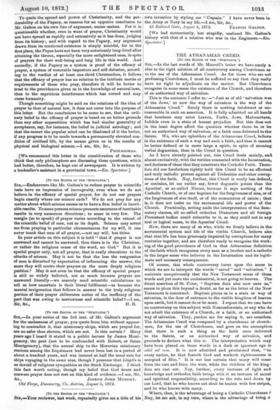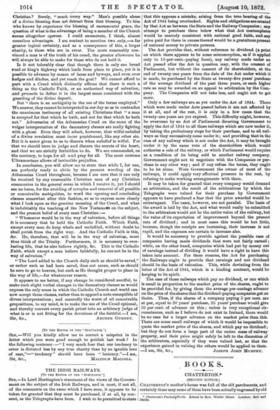THE ATHANASIAN CREED.
[TO THE EDITOR OF THE "SPECTATOR."
the last words of Mr. Maccoll's letter we have surely ft clue to the right solution of all controversy among Churchmen as to the use of the Athanasian Creed. As for those who are not professing Churchmen, I must be suffered to say that they really have no right to adjudicate on the matter. But Churchmen recognise in some sense the existence of the Church, and therefore of an authorised way of salvation.
This is the sentence I refer to : —" Just as of old ' salvation was of the Jews,' so now the way of salvation is the way of the Athanasian Creed." Surely there is nothing intolerant or un- reasonable in such an assertion. It is fully admitted ou all hands that heathens may enter heaven, Turks, Jews, hfahometans, Infidels even in a state of honest prejudice. But this does not in the least degree affect the question whether there be or be not an authorised way of salvation, or a faith once delivered to the Saints. We, who are upholders of the Athanasian Creed, believe in the existence of such a way and such a faith, and that it cannot be better defined or in more large a spirit, in spite of seeming verbal dogmatism, than in the Creed in question.
As I have already pointed out, this Creed deals mainly, and almost exclusively, with the verities connected with the Incarnation, and declares of these that they constitute the Catholic Faith. There- fore did our forefathers rightly hold this Creed to be an effectual and truly catholic protest against all Tridentine and other corrup- tions of the faith. Nay, further, this Creed is really lees defined, or contains, let me rather say, fewer dogmatic points than the Apostles', or so-called Nicene, because it says nothing of the Catholic Church, or of one baptism for the forgiveness of sins, or of the forgiveness of sins itself, or of the communion of saints ; that is, it does not insist on the sacramental life and power of the Church. Practically, setting aside the interpretation of the dam, natory clauses, all so-called orthodox Dissenters and all foreign Protestant bodies could subscribe to it, as they could not in any real or logical sense, to the Apostles' Creed.
Now, there are many of us who, while we firmly believe in the sacramental system and life of the visible Church, believe also that that life has been grievously impaired by corruptions for many centuries together, and are therefore ready to recognise the work- ing of the good providence of God in that Athanasian definition. of the faith which recognises every man as a brother and a catholic in the larger sense who believes in the Incarnation and its legiti- mate and necessary consequences.
Of course, this whole controversy turns upon the sense in
which we are to interpret the words " saved " and "salvation." L maintain unequivocally that the New Testament sense of these words and yet more the ecclesiastical, is not going to heaven. The direct assertion of St. Peter, "Baptism doth also now save us," seems to place this beyond a doubt, as far as the letter of the New• Testament is concerned. Baptism places us in a state or way of salvation, is the door of entrance to the visible kingdom of heaven. upon earth, but it cannot do or be more. I repeat that we can have no controversy on this subject with Nonconformists, or any who do- not admit the existence of a Church, or a faith, or an authorised) way of salvation. They, pardon me for saying it, are outsiders. The Athanasian Creed was composed by a churchman or church- men, for the use of Churchmen, and goes on the assumption. that there is such a thing as the faith once delivered to the Saints, or an authorised way of salvation, and proceeds to declare what this is. The interpretation which may have been placed on these words in a dark or ignorant age is nail ad rem. It is now admitted and proclaimed that, "inr every nation, he that feareth God and worketh righteousness is accepted of Him." It is not less certain that many will come from the east and from the west, while the children of the king- dom are cast out. Nay, further, every increase of light and knowledge and orthodox faith brings with it an increase of moral and spiritual responsibility, according to the rule laid down by our Lord, that he who knows not shall be beaten with few stripes, and be who knows with many.
Where, then, is the advantage of being a Catholic Churchman ? Nay, let me ask, in my turn, where is the advantage of being a Christian? Surely, " much every way." Man's possible abuse of a divine blessing does net detract from that blessing. To him who knows by experience the blessing of sacramental grace, the question of what is the advantage of being a member of the Church seems altogether operose. I could enumerate, I think, almost countless advantages. I am content to mention two only,—a far greater logical certainty, and as a consequence of this, a larger charity, to those who are in error. The more reasonably con- vinced a man is of the truth of his creed, the greater allowance he will always be able to make for those who do not hold it.
Is it not tolerably clear that though there is only one broad road or king's highway which leads from place to place, yet it is possible to advance by means of lanes and byways, and even over &edges and ditches, and yet reach the goal ? We cannot afford to part with a Creed which distinctly affirms that there is such a thing as the Catholic Faith, or an authorised way of salvation, and proceeds to define it in the largest sense consistent with the guarding of the divine deposit.
But " there is an ambiguity in the use of the terms employed." We answer, they cannot be interpreted in our day so as to contradict the unanimous testimony of all existing Christians that " a man is accepted for that which he hath, and not for that which he bath not." Adversaries of the Athanasian Creed on the score of the vulgar interpretation of the damnatory clauses are really fighting with a ghost. Even they will admit, however, that wilful unbelief of a divine revelation must incur punishment, like any other sin. But it is never given to us to discern when unbelief is wilful. For that we should have to judge and discern the secrets of the heart, and that we are strictly forbidden to do. We are commanded, on the contrary, to hope for all and pray for all. The most extreme Ultramontane allows of invincible prejudice.
In conclusion, you will allow me to state that while I, for one, am perfectly ready to abide by the present wording of the Athanasian Creed throughout, because I am sure that it can only be received by any reasonable Christian man of any Christian communion in the general sense in which I receive it, yet I should -see no harm, for the avoiding of scruples and removal of all possible -or conceivable ambiguities, to word the opening and concluding clauses somewhat after this fashion, so as to express more clearly what I look upon as the genuine meaning of the Creed, and what 'is indubitably the teaching of the New Testameft on the subject, and the present belief of every sane Christian:— "Whosoever would be in the way of salvation, before all things it is necessary that he hold the Catholic Faith. Which Faith, except every man do keep whole and undefiled, without doubt he shall perish from the right way. And the Catholic Faith is this, tre: He, therefore, that will be in the way of salvation, must thus think of the Trinity. Furthermore, it is necessary to ever- lasting life, that he also believe rightly, &c. This is the Catholic Faith, which except a man believe faithfully, he cannot be in the way of salvation."
"The Lord added to the Church daily such as should be saved," or rather such as had been saved, does not mean, such as should be sure to go to heaven, but such as He thought proper to place in the way of life,—for whatsoever reason.
It appears to me better, if any change be considered needful, to make such slight verbal changes in the damnatory clauses as would -express the only sense in which the Catholic Church and world can cow accept those clauses, rather than to append a note susceptible of
divers interpretations ; and assuredly the worst of all conceivable ,propositions, to my mind, is to make the use of the Creed optional, and thereby convert every parish priest into an arbitrary judge of what is or is not fitting for the devotions of the faithful.—I am,

































 Previous page
Previous page